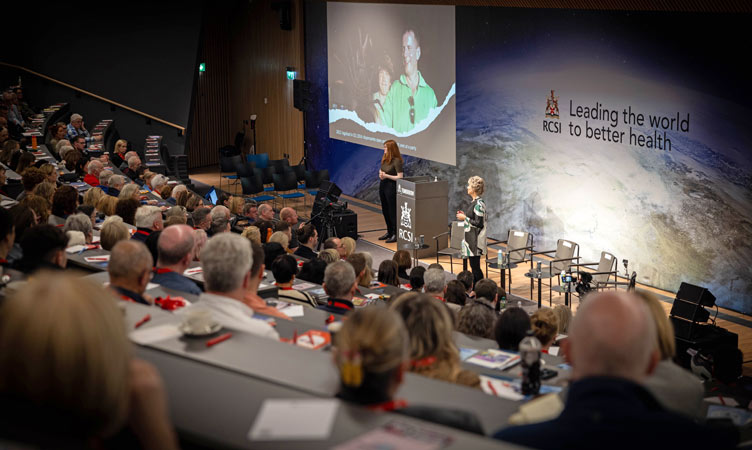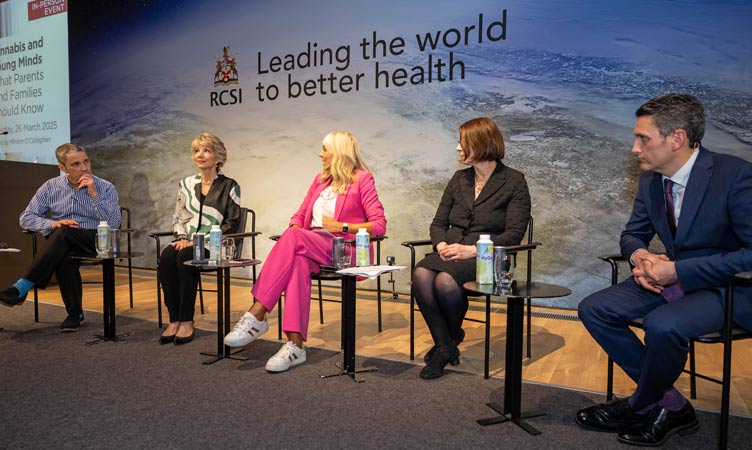In a recent RCSI MyHealth episode, Laura Stack shared the tragic story of her son Johnny who died by suicide at 19 during a cannabis-induced psychosis. Laura and her husband John set up the not-for-profit Johnny’s Ambassadors after their son's death, to help raise awareness of the dangers of cannabis.
Here, drawing on international research and Johnny’s story, Professor Mary Cannon, Professor of Psychiatric Epidemiology and Youth Mental Health at RCSI, outlines the growing scientific evidence linking adolescent cannabis use to increased risks of psychosis, depression and suicide – and the critical need for early parental intervention.
I recently shared a stage at RCSI with Laura Stack, an extraordinary woman whose story has haunted me. She told the audience about her son Johnny, a brilliant, kind-hearted teenager from Colorado who began using cannabis at 14 and, five years later, died by suicide during a psychotic episode. Johnny’s tragic journey is seared in my memory not just because it’s heartbreaking, but because it reflects the very real damage caused by cannabis which I see more and more evidence of in my work as a psychiatrist and in my research.
Cannabis is not the harmless substance many believe it to be. In fact, it’s the most commonly used illicit drug among teenagers, with use typically beginning between the ages of 12 and 17. In Ireland, one-in-five adolescents have tried it. That figure alone is worrying, but what concerns me more is the growing normalisation of cannabis use – a process accelerated by legalisation campaigns around the world.
We often hear that “it’s just weed,” or that cannabis is natural and safe. But the cannabis of today is a world apart from what parents may have encountered in their youth. In the 1970s, a typical joint contained just 1-2% tetrahydrocannabinol (THC), the compound responsible for the drug’s psychoactive effects. Today’s cannabis products can contain 10 times that amount, and many are consumed through high-potency concentrates like vapes. This isn’t the same drug – it’s far more powerful, and far more dangerous.
Increased risks
Johnny’s story is a stark illustration of this danger. Laura told us that he was just 14 when he first tried cannabis at a party. By then, the drug had already been legalised in their state, and products with extraordinarily high THC content were readily available.
Over the next five years, Johnny’s use escalated. The drug slowly transformed her brilliant, loving son into someone she barely recognised – paranoid, aggressive, and delusional. He developed what we now recognise as cannabis-induced psychosis, a condition that causes extreme psychological distress and can trigger suicidal thoughts.
The science supports what Laura and John Stack experienced in their home. Numerous studies now link adolescent cannabis use to a range of mental health issues – increased risk of depression, anxiety, and most concerning of all, a threefold increase in the risk of suicide. The adolescent brain is still developing, and THC can interfere with this process in ways that can lead to long-term damage. Psychotic symptoms such as paranoia, hallucinations, and severe mood swings are tragically common in young users.
Parental influence
What makes this risk even more insidious is that we can’t predict who will be affected. Some young people may experiment and walk away. Others, like Johnny, may find themselves spiralling into addiction and a condition that feels inescapable. There are no warning signs, no genetic markers we can reliably use to screen for vulnerability. That unpredictability should be reason enough for caution.
Yet, too often, we underestimate the importance of parental influence. Our own research at RCSI has shown that young people whose parents express firm opposition to cannabis are far less likely to use it. Those with parents who are unaware, indifferent, or permissive face a higher risk. In families where cannabis use was strongly discouraged, over 95% of teens avoided the drug. That’s a powerful protective factor – and one that is entirely within our control.
As a parent myself, I understand how challenging these conversations can be. It’s easy to feel overwhelmed or uncertain, especially when misinformation is so widespread. But the truth is, our children need us to be informed. They need us to talk about the dangers – not in a way that shames or frightens them, but in a way that respects their intelligence and equips them with the facts.
Raising awareness
Johnny’s story is a devastating example of what can happen when those facts are missing. Laura and John didn’t realise how dangerous cannabis had become. They thought, as many of us once did, that it was just a phase, a minor rebellion. But they learned – too late – that cannabis today is neither minor nor harmless.
If we truly care about our children’s mental health, then we have a responsibility to share stories like Johnny’s – not to sensationalise, but to inform. His life was full of promise. His death was preventable. Let’s ensure no other family has to learn this lesson the hard way.
Laura and John Stack established Johnny’s Ambassadors after their son’s death and I am proud to be a member of the not-for-profit's Scientific Advisory Board. I am so grateful to them, not just for joining us for this episode of RCSI MyHealth, but for the courage they’ve shown in harnessing their tragedy to help raise awareness of the dangers of cannabis.
You can watch Cannabis and Young Minds: What Parents and Families Should Know below, or find a link to the podcast and useful resources here.
Please note
- This video is not suitable for under 18s. You can find content suitable for younger people at the Johnny’s Ambassadors website.
- If you or someone you know is affected by addiction, you can call the HSE Drugs and Alcohol Helpline on 1800 459 459 (Ireland). The Pieta House 24-our freephone crisis helpline can be reached on 1800 247 247.
 Mary Cannon is Professor of Psychiatric Epidemiology and Youth Mental Health at RCSI's Department of Psychiatry.
Mary Cannon is Professor of Psychiatric Epidemiology and Youth Mental Health at RCSI's Department of Psychiatry.
RCSI is committed to achieving a better and more sustainable future through the UN Sustainable Development Goals.
![]()
![]()
![]()



